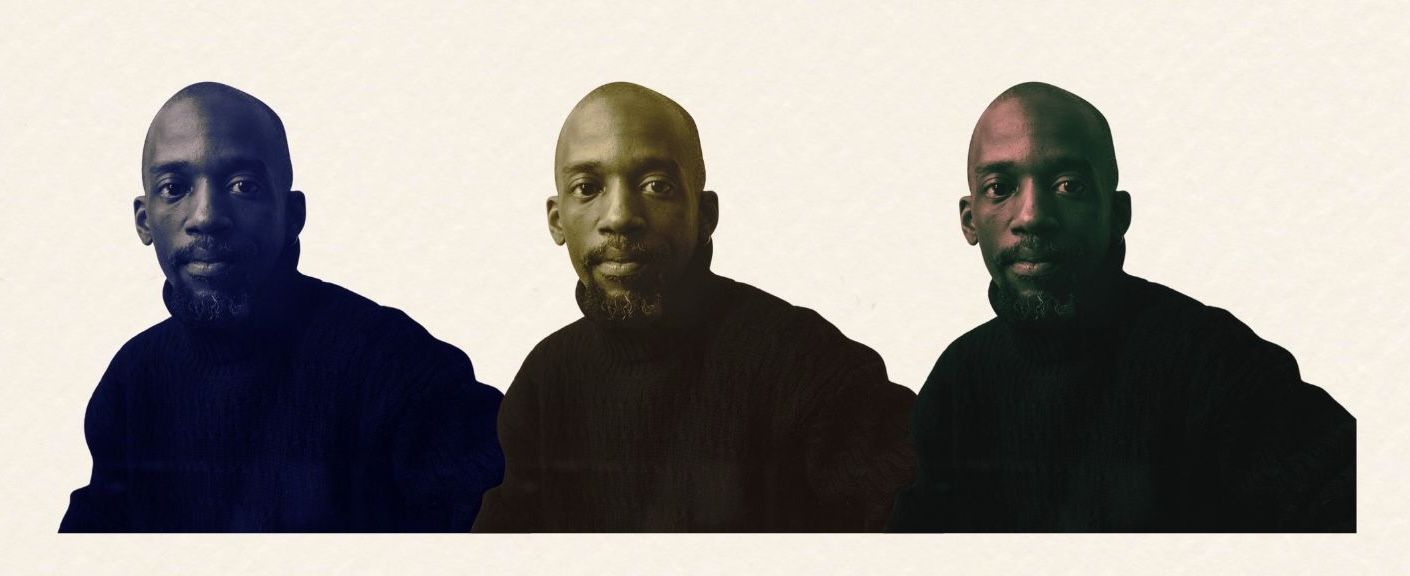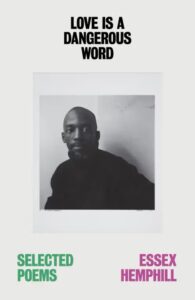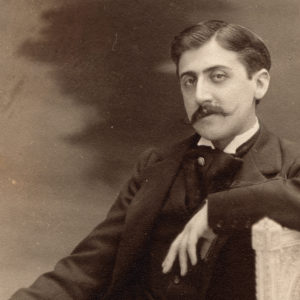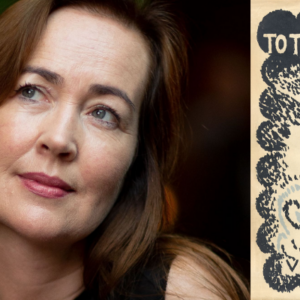
John Keene on the Life and Literary Legacy of Essex Hemphill an Early Poetic Chronicler of Black Queer Life
In Praise of an Early Poetic Chronicler of Black Queer Life
Throughout Essex Hemphill’s poetry, what we registered was his attentiveness to craft as well as statement, to the possibilities of performance, of form, of the line, and to the expressive content, which is to say the lives and stories, his life and story, that these lines bore and made visible. He was a lyric poet to his core, and a political poet who knew that the most devastating critique could hinge on many of poetry’s numerous resources, any of which he wielded when needed.
What we also appreciated was how open he was to self-reflection and reassessment, and how much he anticipated and opened up spaces for an array of poetics and poetries to come. I, like so many other writers of my generation and subsequent generations, would not be publishing today if it weren’t for Essex Hemphill’s example, his courage and daring, and his fearlessness and willingness to place his art on the stage and page before audiences and readers.
Rereading and assembling these poems took on a particular poignancy for me, because I had the pleasure, as a young writer, not only of meeting and interviewing Hemphill in 1989, as part of the Dark Room Writing Collective’s reading series, based then in Cambridge, Massachusetts, but of having Hemphill serve as one of my first editors, when he selected and then proceeded to help me refine one of my first published short stories for the anthology Brother to Brother. He was generous but rigorous in his comments, never failing to suggest striking or rewriting passages that I was wedded to, a process which, I realized on rereading, showed me the breadth of his talents as a reader and writer.
Co-editing this collection of poems, I would not deign to change a word, but in studying Hemphill’s poetics, how he drafted, ordered, and revised his poems, I continue to learn invaluable lessons about poetic craft and literary art in general. I also believe his generosity of spirit and intellectual and artistic rigor shine through in these selected poems.
He was a lyric poet to his core, and a political poet who knew that the most devastating critique could hinge on many of poetry’s numerous resources, any of which he wielded when needed.
Reading Hemphill’s work reminds me not only of his remarkable individual talent and many gifts as a poet, but also that he was one of the leading and most accomplished figures in a generation of Black gay, lesbian, transgender, and queer writers and artists who came of age in the wake of the Civil Rights, Black Arts, Gay Liberation and LGBTQ Equality, Women’s Rights, Lesbian Separatist, and Black and Third World Feminism movements. His work, like that of his peers, powerfully reflected, acknowledged, assimilated, and advanced the best lessons of these movements.
Like a number of his Black LGBTQ peers, Hemphill began publishing and performing his work as more spaces—journals, little magazines, anthologies, and small presses, many edited and published by Black LGBTQ writers and artists, along with reading and screening venues, including bookstores, colleges and universities, conferences, and nightclubs, etc.—opened up and welcomed these artists’ visions and voices. For a moment, a flowering of Black LGBTQ literary and artistic production was visible to anyone paying attention. Hemphill even started his own small press, Be Bop Books, in Washington, D.C.
I am also reminded that within a few years, the AIDS pandemic took so many of these talented writers from us, often abruptly and before many could realize the rich promise of the work they had shared with the world; and so this selected volume stands as a tribute to Hemphill’s distinctive poetics, but also should send us back to those many poets, writers, artists, whom we lost prematurely to AIDS and other social, political, and economic depredations, especially as we witness yet more waves of anti-LGBTQ, racist, misogynistic, and classist backlash to the achievements these movements have made.
In conclusion, co-editing this volume was a labor of deep love and gratitude and tribute. It is our sincere hope that readers will return to it regularly and seek out more of Essex Hemphill’s work and that of his LGBTQ contemporaries, who created vital and enduring artistic and activist spaces—fusing the two in ways we might take for granted today—for those who would come after them, making possible the ever-expanding universe of letters in American, African American, and African Diasporic LGBTQ writing that we appreciate today.
–John Keene
*
“Heavy Breathing”
… and the Negro every day lower, more cowardly, more sterile, less profound, more spent beyond himself, more separate from himself, more cunning with himself, less straight to himself,
I accept, I accept it all …
–Aimé Césaire,
Return to My Native Land
At the end of heavy breathing,
very little of my focus intentional,
I cross against the light of Mecca.
I recall few instances of piety
and strict obedience.
Nationalism disillusioned me.
My reflections can be traced
to protest slogans
and enchanted graffiti.
My sentiments—whimsical—
the dreams of a young, yearning bride.
Yes, I possess a mouth such as hers:
red, petulant, brutally pouting;
or at times I’m insatiable—
the vampire in the garden, demented
by the blood of a succulent cock.
I prowl in scant sheaths of latex.
I harbor no shame.
I solicit no pity.
I celebrate my natural tendencies,
photosynthesis, erotic customs.
I allow myself to dream of roses
though I know
the bloody war continues.
I am only sure of this:
I continue to awaken
in a rumpled black suit.
Pockets bulging with tools
and ancestral fossils.
A crusty wool suit
with salt on its collar.
I continue to awaken
shell-shocked, wondering
where I come from
beyond mother’s womb,
father’s sperm.
My past may be lost
beyond the Carolinas
North and South.
I may not recognize
the authenticity
of my Negritude
so slowly I awaken.
Silence continues
dismantling chromosomes.
Tampering with genetic codes.
I am sure of this
as I witness Washington
change its eye color
from brown to blue;
what kind of mutants are we now?
Why is some destruction so beautiful?
Do you think I could walk pleasantly?
and well-suited toward annihilation?
with a scrotal sack full
of primordial loneliness
swinging between my legs
like solid bells?
I am eager to burn
this threadbare masculinity,
this perpetual black suit
I have outgrown.
At the end of heavy breathing,
at the beginning of grief and terror,
on the X2, the bus I call a slave ship.
The majority of its riders Black.
Pressed to journey to Northeast
into voodoo ghettos
festering on the knuckles
of the “Negro Dream.”
The X2 is a risky ride.
A cargo of block boys, urban pirates,
the Colt 45 and gold-neck-chain crew
are all part of this voyage,
like me, rooted to something here.
The women usually sit
at the front.
The unfortunate ones
who must ride in the back
with the fellas
often endure foul remarks;
the fellas are quick to call them
out of name, as if all females
between eight and eighty
are simply pussies with legs.
The timid men, scattered among
the boat crew and crack boys,
the frightened men
pretend invisibility
or fake fraternity
with a wink or nod.
Or they look the other way.
They have a sister on another bus,
a mother on some other train
enduring this same treatment.
There is never any protest.
No peer restraint. No control.
No one hollered STOP!
for Mrs. Fuller,
a Black mother murdered
in an alley near home.
Her rectum viciously raped
with a pipe. Repeatedly
sodomized repeatedly
sodomized before a crowd
that did not holler STOP!
Some of those watching knew her.
Knew her children.
Knew she was a member of the block.
Every participant was Black.
Every witness was Black.
Some were female and Black.
There was no white man nearby shouting
“BLACK MAN, SHOVE IT IN HER ASS
TAKE SOME CRACK! SHOVE IT IN HER ASS,
AND THE REST OF YOU WATCH!”
At the end of heavy breathing
the funerals of my brothers
force me to wear
this scratchy black suit.
I should be naked
seeding their graves.
I go to the place
where the good feelin’ awaits me
self-destruction in my hand,
kneeling over a fucking toilet,
splattering my insides
in a stinking, shit-stained bowl.
I reduce loneliness to cheap green rum,
spicy chicken, glittering vomit.
I go to the place
where danger awaits me,
cake-walking
a precarious curb
on a comer
where the absence of doo-wop
is frightening.
The evidence of war
and extinction surround me.
I wanted to stay warm
at the bar,
play to the mischief,
the danger beneath a mustache.
The drag queen’s perfume
lingers in my sweater
long after she dances
out of the low-rent light,
the cheap shots and catcalls
that demean bravery.
And though the room
is a little cold and shabby,
the music grating,
the drinks a little weak,
we are here
witnessing the popular one
in every boy’s town.
A diva by design.
Giving us silicone titties
and dramatic lip synch.
We’re crotch to ass,
shoulder to shoulder,
buddy to buddy,
squeezed in sleaze.
We want her to work us.
We throw money
at her feet.
We want her to work us,
let us see
the naked ass of truth.
We whistle for it,
applaud, shout vulgarities.
We dance like beasts
near the edge of light,
choking drinks.
Clutching money.
And here I am,
flying high
without ever leaving the ground
three rums firing me up.
The floor swirling.
Music thumping at my temple.
In the morning
I’ll be all right.
I know I’m hooked on the boy
who makes slaves out of men
I’m an oversexed
well-hung
Black Queen
influenced
by phrases like
“the repetition of beauty.”
And you want me to sing
“We Shall Overcome?”
Do you daddy daddy
do you want me to coo
for your approval?
Do you want me
to squeeze my lips together
and suck you in?
Will I be a “brother” then?
I’m an oversexed
well-hung
Black Queen
influenced
by phrases like
“I am the love that dare not speak its name.”
And you want me to sing
“We Shall Overcome”?
Do you daddy daddy
do you want me to coo
for your approval?
Do you want me
to open my hole
and pull you in?
Will I be “visible” then?
I’m an oversexed
well-hung
Black Queen
influenced
by phrases like
“Silence = death.”
Dearly Beloved,
my flesh like all flesh
will be served
at the feast of worms.
I am looking
for signs of God
as I sodomize my prayers.
I move in and out of love
and pursuits of liberty,
spoon-fed on hypocrisy.
I throw up gasoline
and rubber bullets,
an environmental reflex.
Shackled to shimmy and shame,
I jam the freeway
with my vertigo. I return
to the beginning, to the opening of time
and wounds. I dance
in the searchlight
of a police cruiser.
I know I don’t live here anymore
to witness.
I have been in the bathroom weeping
as silently as I could.
I don’t want to alarm
the other young men.
It wasn’t always this way.
I used to grin.
I used to dance.
The streets weren’t always
sick with blood,
sick with drugs.
My life seems to be
marked down
for quick removal
from the shelf.
When I fuck
the salt tastes sweet.
At the end of heavy breathing
for the price of the ticket
we pay dearly, don’t we darling?
Searching for evidence
of things not seen.
I am looking
for Giovanni’s room
in this bathhouse.
I know he’s here.
I cruise a black maze,
my white sail blowing full.
I wind my way through corridors
lined with identical doors
left ajar, slammed shut,
or thrown open to the dark.
Some rooms are lit and empty,
their previous tenant
soon-to-be-wiped-away,
then another will arrive
with towels and sheets.
We buy time here
so we can fuck each other.
Everyone hasn’t gone to the moon.
Some of us are still here,
breathing heavy,
navigating this deadly
sexual turbulence;
perhaps we are
the unlucky ones.
Occasionally I long
for a dead man
I never slept with.
I saw you one night
in a dark room
caught in the bounce of light
from the corridor.
You were intent
on throwing dick
into the depths
of a squirming man
bent to the floor,
blood rushing
to both your heads.
I wanted to give you
my sweet man pussy,
but you grunted me away
and all other Black men
who tried to be near you.
Our beautiful nigga lips and limbs
stirred no desire in you.
Instead you chose blonde,
milk-toned creatures to bed.
But you were still one of us,
dark like us, despised like us.
Occasionally I long
to fuck a dead man
I never slept with.
I pump up my temperature
imagining his touch
as I stroke my wishbone,
wanting to raise him up alive,
wanting my fallen seed
to produce him full-grown
and breathing heavy
when it shoots
across my chest;
wanting him upon me,
alive and aggressive,
intent on his sweet buggery
even if my eyes do
lack a trace of blue
At the end of heavy breathing
the fire quickly diminishes.
Proof dries on my stomach.
I open my eyes, regret
I returned without my companion,
who moments ago held my nipple
bitten between his teeth,
as I thrashed about
on the mercy of his hand
whimpering in tongues.
At the end of heavy breathing
does it come to this?
Filtering language of necessity?
Stripping it of honesty?
Burning it with fissures
that have nothing to do with God?
The absolute evidence of place.
A common roof, discarded
rubbers, umbrellas,
the scratchy disc of memory.
The fatal glass slipper.
The sublimations
that make our erections falter.
At the end of heavy breathing
who will be responsible
for the destruction of human love?
Who are the heartless
sons of bitches
sucking blood from dreams
as they are born?
Who has the guts
to come forward
and testify?
Who will save
our sweet world?
We were promised
this would be a nigga fantasy
on the scale of Oz.
Instead we’re humiliated,
disenchanted, suspicious.
I ask the scandal-infested leadership
“What is your malfunction? Tell us
how your automatic weapons
differ from the rest.”
They respond with hand jive,
hoodoo hollering,
excuses to powder the nose,
or they simply disappear
like large sums of money.
And you want me to give you
a mandatory vote
because we are both Black
and descendants of oppression?
What will I get in return?
Hush money from the recreation fund?
A kilo of cocaine?
A boy for my bed
and a bimbo for my arm?
A tax break on my new home
west of the ghetto?
You promised
this would be a nigga fantasy
on the scale of Oz.
Instead, it’s “Birth of a Nation”
and the only difference
is the white men
are played in Blackface.
At the end of heavy breathing
as the pickaninny frenzy escalates,
the home crew is illin’
on freak drugs
and afflicted racial pride.
The toll beyond counting,
the shimmering carcasses
all smell the same.
No matter which way
the wind blows
I lose a god
or a friend.
My grieving is too common
to arouse the glance of angels.
My shame is too easy to pick up
like a freak from the park
and go.
Urged to honor paranoia,
trained to trust a dream,
a reverend, hocus-pocus
handshakes; I risk becoming schizoid
shuffling between Black English
and assimilation.
My dreamscape is littered
with effigies of my heroes.
I journey across
my field of vision
raiding the tundra
of my imagination.
Three African rooftops
are aflame in my hand.
Compelled by desperation,
I plunder every bit of love
in my possession.
I am looking for an answer
to drugs and corruption.
I enter the diminishing
circumstance of prayer.
Inside a homemade Baptist church
perched on the edge
of the voodoo ghetto,
the murmurs of believers
rise and fall, exhaled
from a single spotted lung.
The congregation sings
to an out-of-tune piano
while death is rioting,
splashing blood about
like gasoline,
offering pieces of rock
in exchange
for throw-away dreams.
The lines of takers are too long.
Now is the time
to be an undertaker
in the ghetto,
a black dress seamstress.
Now is not the time
to be a Black mother
in the ghetto,
the father of sons,
the daughters of any of them.
At the end of heavy breathing
I engage in arguments
with my ancestral memories.
I’m not content
with nationalist propaganda.
I’m not content
loving my Black life
without question.
The answers of Negritude
are not absolute.
The dream of King
is incomplete.
I probe beneath skin surface.
I argue with my nappy hair,
my thick lips so difficult
to assimilate.
Up and down the block we battle,
cussing, kicking, screaming,
threatening to kill
with bare hands.
At the end of heavy breathing
the dream deferred
is in a museum
under glass and guard.
It costs five dollars
to see it on display.
We spend the day
viewing artifacts,
breathing heavy
on the glass
to see—
the skeletal remains
of black panthers,
pictures of bushes,
canisters of tears.
__________________________________

From Love Is a Dangerous Word: Selected Poems by Essex Hemphill, edited by John Keene and Robert F. Reid-Pharr. Copyright © 2025. Available from New Directions.
Essex Hemphill
Essex Hemphill (1957–1995) was born in Chicago and raised in Washington, D.C. He was a member of the poetry collective Cinque, a frequent collaborator with the Emmy award-winning filmmaker Marlon Riggs, and the editor of the Lambda Literary Award-winning anthology Brother to Brother: New Writings by Black Gay Men (1991). His collection Ceremonies: Prose and Poetry (1992) won the National Library Association’s Gay, Lesbian, and Bisexual New Author Award.












